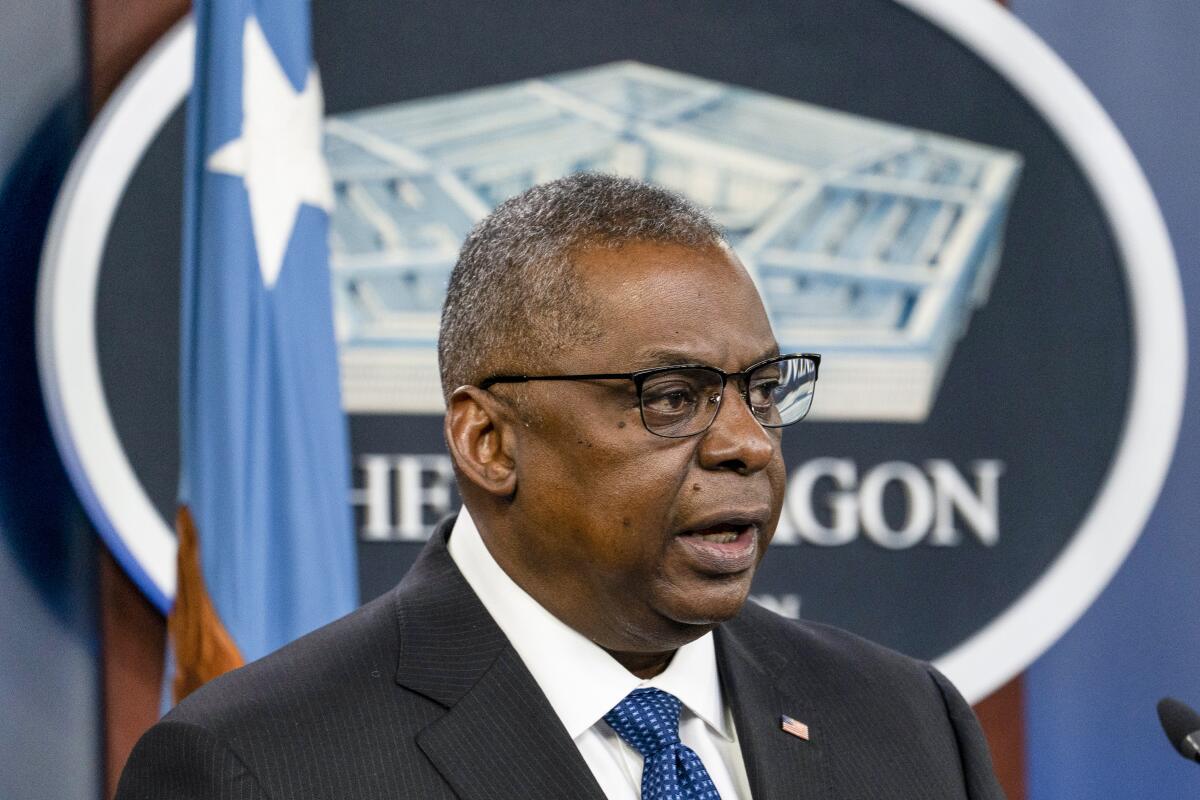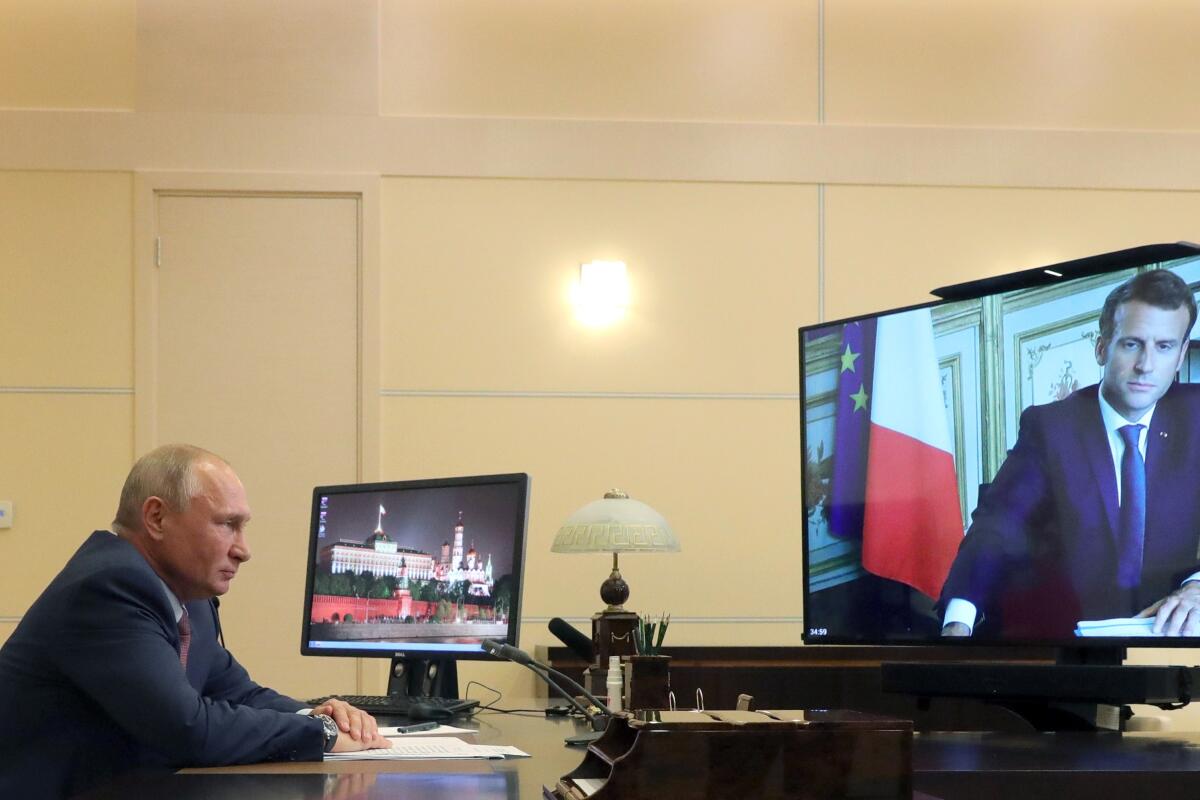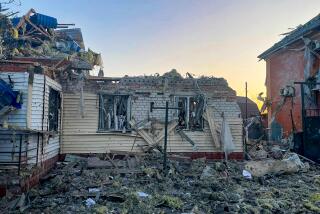Top U.S. defense officials warn against ‘horrific’ Russian invasion of Ukraine

- Share via
WASHINGTON — The United States’ top military and Defense commanders on Friday added their voices to stark warnings that Russia may be about to invade Ukraine, while the president of the former Soviet republic separately worked to calm his citizens and criticized the U.S. for sounding an alarm.
“War is not inevitable,” said a stone-faced Gen. Mark A. Milley, the nation’s most senior military official. But, he added, “given the type of forces arrayed ... if that was unleashed on Ukraine, it would be significant, very significant, and it would result in a significant amount of casualties.”
A military action would be “horrific” if Russian troops were to push through dense urban areas in the dead of winter, he said.
Milley, chairman of the Joint Chiefs of Staff, stood alongside Defense Secretary Lloyd J. Austin III at a news conference at the Pentagon. Their joint address to the media signified the Biden administration’s efforts to send messages of unity to NATO and of painful consequences for Russian President Vladimir Putin. The last time the two appeared together in such a forum was last year during the fall of Afghanistan and hasty withdrawal of U.S. troops, ending a 20-year war.
Both Austin and Milley said a Russian invasion might be averted by diplomatic efforts. But they said Putin’s amassing of more than 100,000 Russian troops on Ukraine’s borders gives the former KGB officer “a range of options” to pursue.
“While we don’t believe that President Putin has made a final decision to use these forces against Ukraine,” Austin said, “he clearly now has that capability.”
Troops on alert
The U.S. has put 8,500 of its troops on alert, able to deploy to the eastern flank of NATO — not to Ukraine proper — quickly. President Biden told reporters Friday night that he’d be moving troops to Eastern Europe “in the near term.” The U.S. and other NATO countries have been shipping millions of dollars in military aid to Ukraine, with the U.S. sending $650 million in the past year, according to Austin.
Milley noted that Ukraine’s military is more capable now than it was in 2014, when Russia invaded the Crimean peninsula and threw its support behind separatist fighters in two eastern Ukrainian regions.
He and Austin listed an array of tactics Putin could employ short of a military invasion, including a destabilizing sabotage campaign or an effort to stage a coup. Putin could try to replace the elected president of Ukraine or recognize breakaway regions of the country to weaken the central government’s hold, as Moscow has attempted in the east, Milley and Austin said.
Moscow is already suspected of numerous cyberattacks inside Ukraine and intense disinformation campaigns aimed at undermining the government in Kyiv.
“We remain focused on Russian disinformation, including the potential creation of pretext for further invasion or strikes” on the eastern Donbas region, Austin said. “This is straight out of the Russian playbook. They’re not fooling us.”
Leaders and top diplomats from the U.S. and Europe have spent weeks attempting to talk Putin out of invading Ukraine.
The Russians insisted that Washington and NATO provide a written response to Moscow’s demands, chief among them that Ukraine never be allowed to join the North Atlantic Treaty Organization. The Western officials delivered the missive this week but rejected the proposal out of hand, insisting that all countries should be allowed to apply for NATO membership.
Putin and Macron

Putin spoke Friday with French President Emmanuel Macron in the latest round of diplomacy aimed at easing tensions. The exchange was tense, French media reported. The Kremlin said Putin complained to Macron that the U.S. and NATO had failed to take his demands seriously.
The Kremlin also said Putin urged the West to tell Ukraine it had to negotiate with the separatists — a suggestion not likely to be palatable in Kyiv nor among allies.
Russian Foreign Minister Sergei Lavrov repeated his government’s position that there are no plans to invade Ukraine. But he also said that because of the U.S. and NATO response to Moscow’s position, “I don’t see any room for compromise here.”
“There won’t be a war as far as it depends on the Russian Federation; we don’t want a war,” he told Russian radio. “But we won’t let our interests be rudely trampled on and ignored.”
Russia on Friday portrayed a United Nations Security Council meeting scheduled for Monday as a PR ploy. The council will debate what U.S. Ambassador to the U.N. Linda Thomas-Greenfield described as Russia’s “threatening behavior.” As one of five permanent members of the Security Council, Russia can veto any resolution it might adopt.
Pushback from Ukraine
After Biden spoke with his Ukrainian counterpart on Thursday — warning of the “distinct possibility” of a Russian invasion, according to the White House — President Volodymyr Zelensky said he appreciated Western support but cautioned against stoking panic over an invasion, his office said. Officials in Kyiv are worried that talk of war will trigger the flight of both people and capital.
Zelensky held a news conference Friday in Kyiv with locally based international media to plead for help in tamping down fear.
“We don’t need this panic,” Zelensky said. “There are signals even from respected leaders of states; they just say that tomorrow there will be war. This is panic. How much does it cost for our state?”
Zelensky criticized the U.S. and a few other Western countries for beginning to remove some diplomatic personnel or their families from Kyiv. Those actions are premature, he said, adding, “Ukraine is not the Titanic.”
More to Read
Get the L.A. Times Politics newsletter
Deeply reported insights into legislation, politics and policy from Sacramento, Washington and beyond. In your inbox three times per week.
You may occasionally receive promotional content from the Los Angeles Times.











